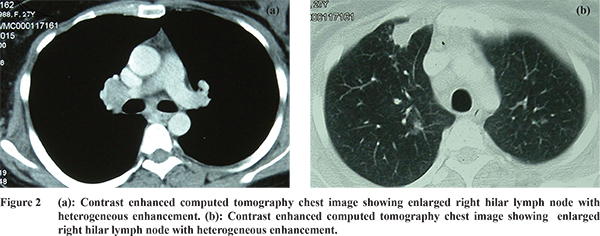48uep6bbphidcol2|ID
48uep6bbphidvals|1777
48uep6bbph|2000F98CTab_Articles|Fulltext
Infliximab is a chimeric antibody with human and murine portions and has been a frontline drug in the management of inflammatory bowel disease. TSH regulated TNF-a receptors exist and it is possible that Infliximab may affect thyroid function via multiple mechanisms.
1
Case Report
A 27-year old lady was suffering from ulcerative colitis for 4 years. She was on biological therapy from one year since Jan 2014 : Infliximab 5 mg/kg (300 mg) every 8 weeks. She had history of cervical lymph node tuberculosis in 2008, for which she had received ATT. Chest CT Scan before starting Infliximab was normal. She had received 8 doses, the last dose given on the 19th of February 2015. She was admitted in the first week of April 2015 with complaints of neck pain with swelling, palpitations and fever and no history of recent upper respiratory tract infection. On examination, she had tachycardia (pulse rate 120/min), neck swelling with tenderness. Her free T3 (6.73 pg/mL [2.30-4.20]) and Free T4 (2.79 ng/mL [0.80-1.76]) were elevated and TSH (0.036 µIU/mL [0.550-4.780]) was low with anti-TPO antibodies negative (29.90 U/mL [<60]).Ultrasound showed both lobes of thyroid enlarged including isthmus, with multiple hypo echoic nodules of varying sizes (Figures 1a,b,c) and 99m Tc-pertechnetate thyroid scan showed no radiotracer uptake in the thyroid bed. RAIU scan was 0.1% at 2 hours and 0.3% at 24 hours. She was managed symptomatically with propranolol 20 mg BD and anti-inflammatory agent (indomethacin). She recovered completely and is on follow up. She was also suffered reactivation of tuberculosis with mediastinal lymphadenopathy and right upper lobe infiltrate (Figures 2a,b) for which anti tuberculous therapy category II was initiated.


Discussion
We describe a case of Infliximab induced sub-acute thyroiditis in a patient of ulcerative colitis treated with infliximab. Hashimoto’s thyroiditis was extremely unlikely in view of absent anti-TPO antibodies in the serum. TNF-a affects thyroid function and multiple mechanisms and associations have been explained e.g TNF-a induced inhibition of thyroid function in rats,
2 presence of TNF-a receptors in human thyroid tissue,
1 elevated TNF-a and its receptors in cases of hypothyroidism,
3 relationship between TNF-a and flare of pre-existing hypothyroidism.
4 Infliximab is a chimeric antibody with human and murine components. Infliximab is known to precipitate autoimmune disorders like lupus, and cutaneous vasculitis through production of antibodies. These antibodies can also affect response to infliximab. These antibodies appear after 3-6 months of therapy.
5 Destructive thyroiditis by use of infliximab has been reported.
6 Following extensive search and after carefully excluding other causes, we tentatively remark that ours may be the first report of sub-acute thyroiditis following Infliximab use. The exact mechanism of Infliximab causing thyroiditis/sub-acute thyroiditis needs to be investigated.
References
- X.P.Pang, J.M. Hershman, M.Chung et al. Characterization of tumor necrosis factor-a receptors in human and rat thyroid cells and regulation of the receptors by thyrotropin.Endocrinology. 1989;125:1783-9.
- K.T. Tang, L.E. Braverman, W.J. DeVito.Tumour necrosis factor-a and interferon-? modulate gene expression of type 1 5” - deiodinase, thyroid peroxidase, and thyroglobulin in FRTL-5 rat thyroid cells. Endocrinology. 1995;136:881-8.
- J.J. Diez, A. Hernanz, S. Medina et al. Serum concentrations of tumour necrosis factor-alpha (TNF-a) and soluble TNF-a receptor p55 in patients with hypothyroidism and hyperthyroidism before and after normalization of thyroid functions. Clinical Endocrinology. 2002;57:515-21.
- H. Miryakoshi, K. Ohsawa, H. Yokoyama et al. Exacerbation of hypothyroidism following tumour necrosis factor-a infusion. Internal Medicine. 1992;31:200-03.
- T.R.D.J. Radstake, M. Svenson, A. M. Eijsbouts et al. Formation od antibodies against infliximab and adalimumab strongly correlates with functional drug levels and clinical responses in rheumatoid arthritis. Annals of the Rheumatic Diseases. 2009;68:1739-45.
- Ozkan C, Altinova AE, Cerit ET et al. Destructive thyroiditis followed by hypothyroidism associated with infliximab therapy. Endocr Pract. 2014;20(11):e207-10.